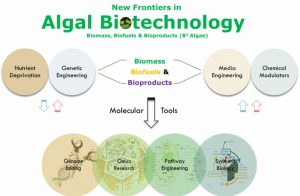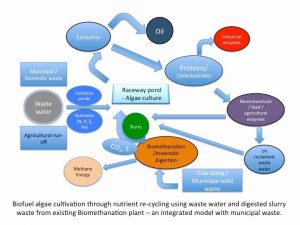Recent developments and future of algal biotechnology
- Current biotechnology aims to provide a comprehensive and reliable source of data on the recent advances and coming perspectives in fundamental themes of biotechnology.
- Algal biotechnology has made important progress during the past 20 years.
- Algae are already used as a bioreactor for yielding bioproducts such as pharmaceutical, nutraceutical, cosmetics, pigment and other valuable chemicals, significance add product, algal founded biomaterials, feed aquaculture and more, in addition, many efforts are currently being undertaken to make algae active for the production of bioenergy and biofuels.
- Some algal-based strategies also meet the necessities for use in biodegradation, bioconversion, bioremediation or other pollution results.

- A powerful driving force in algae biotechnology is the and teasing option to use genetically improved organism.
- Selectable marker gene reporter gene consecutive and switchable promoters transformation techniques and other genetic tools and methods are already obtainable for quite a few algae species and this molecular toolbox is becoming increasingly vital.
- Genetically engineered algae guaranteed a much wider field of the application then an modified organism or breed as an example through additional the acquired physiological capabilities and new biochemical conclusion or even pathways.
- For sometime light-sensitive proteins from algae are even being used in brain science and they represent a cornerstone in the emergent field of optogenetics in transgenic animal this algal ion channel is worthy to turn individual neurons and off instantly in a light-dependent manner.
- In basic research approach applied research oftentimes takes benefit of mass culture techniques for the elderly.

- Large scale industrial harvest of bioproducts from genetically engineered, bred or unmodified algae expect state-of-the-art bioprocess engineering, fermentation, harvesting and downstream processing.
- Microalgae harvest of a wide range of bioproducts include polysaccharides liquid pigment-protein vitamin bioactive compounds. The attention in microalgae as a valid and sustainable feedstock for biofuel production has promoted a new guide in the biorefinery.
- Growth enhancement strategies and genetic engineering may be utilized to enhance their potential as a future source of renewable bioproducts.
- Microalgae possess a high quantity of different carbohydrates such as glycogen, starch, agar and cellulose which can easily be modified to form and table sugars for bioethanol production.
- Algal biotechnology shows that it is possible to couple the production of bioproducts with the utilization of reserves contained in various waste-streams, such as those of the industrial, municipal and agro-industrial sectors.
- Recent advances in algal biotechnology focusing on the production of bioproducts by handling various waste-streams in the Circular Economy framework works dealing with cultivation, safety, feasibility and sustainability aspects of the utilization of waste-streams as nutrient origins for growing algal biomass and the production of bio-based goods.
References
- https://www.researchgate.net/publication/305451219_Current_advances_in_algae_biotechnology_III
- https://www.sciencedirect.com/science/article/abs/pii/073497509091993Q
- https://www.mdpi.com/journal/applsci/special_issues/algal_economy